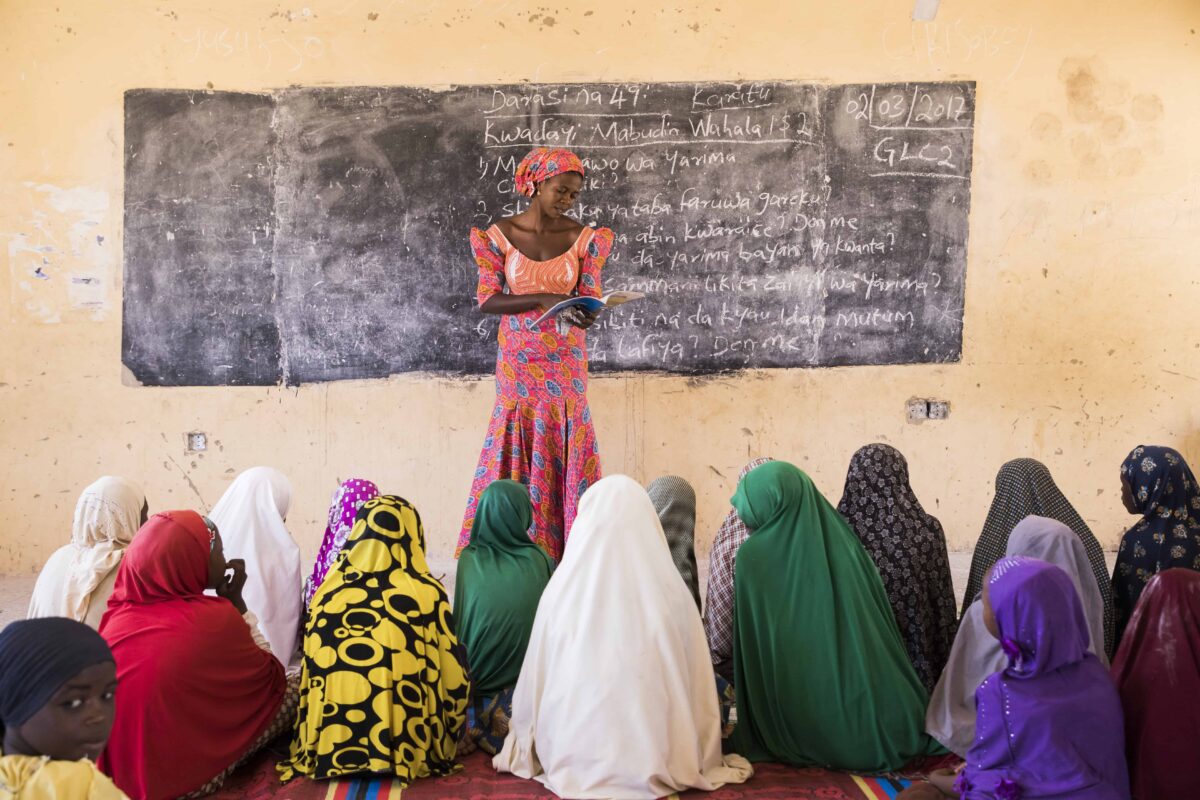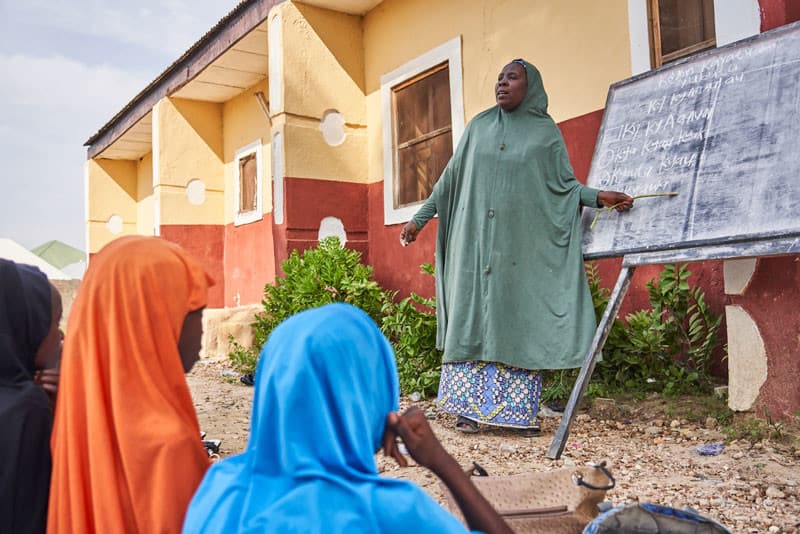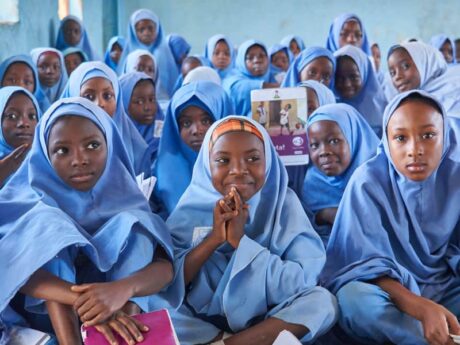Sokoto, NigériaA wide grin spreads across Ahmad Yahya’s face as he talks about his oldest daughter, Husbanatu. Her love for learning makes him immensely proud.
“She is following the footsteps of her mother,” says Yahya, who is the father to four girls in primary school. “Education first starts at home, and we are working with our daughters so they grow up in a different environment in Nigeria.”
A police officer in the remote region of Gidan Madi in Nigeria’s Sokoto state, Yahya says he and his wife, who followed her own dreams to acquire a higher degree, are teaching their children to value education and to reach for their goals.
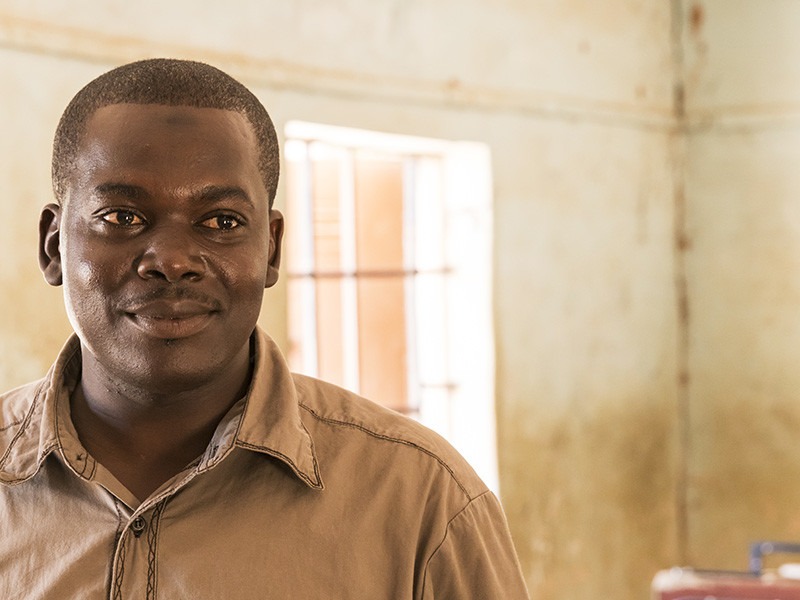
“Whenever a woman has a degree, she has choices,”ele diz. “I want my girls to receive an education and to have multiple degrees. If they want to marry a man of their choice, there is no problem. But my hope is that they prioritize education and attend university.”
Nine-year-old Husbanatu is one of more than 487,000 young students in northern Nigeria improving their reading and writing skills through an early grade reading program called Vamos ler! (Vamos ler! em Hauçá).
Financiado pelo NÓS. Agência de Desenvolvimento Internacional, o Iniciativa de Educação do Norte Plus o projeto está sendo implementado em escolas formais e não formais nos estados de Sokoto e Bauchi, na Nigéria, com o objetivo de melhorar as habilidades de leitura por mais de 1.4 milhões de alunos do ensino fundamental. O projeto é implementado pela Creative Associates International.
Making strides in girls’ education
Along with improving early grade reading and writing skills, the Northern Education Initiative Plus project works with civil society organizations to identify women groups to serve as community partners in improving access to education for girls.
Do 57 milhões de crianças fora da escola no mundo, mais do que 10.5 milhão deles estão na Nigéria. Sobre 60 por cento of those out-of-school children are girls.
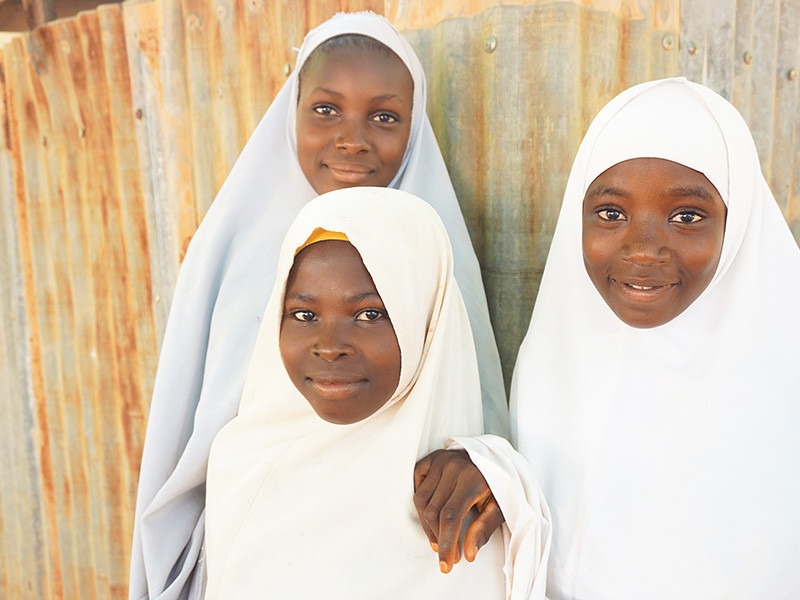
Working closely with communities, the project identifies drivers of gender disparities, ensures that positive role models exist for both girls and boys, advocates for gender equality in education and encourages equal educational opportunities for all children.
Mallam Auwalu Muhammad Ango, Husbanatu’s teacher, says the primary school in the Tangaza Local Government Area where the girl attends classes collaborates with parents to ensure they put more effort into educating their children – especially young girls.
“The number of female children attending school has grown and the girls have given more effort into learning how to read and write,”ele diz.
The school’s efforts to engage female students and their parents is an important step in tackling Nigeria’s gender inequality. In remote areas of Nigeria, educating girls has been a challenge.
Farming families often prioritize working in the fields over receiving an education. Entrenched cultural and gender norms make accessing education even more difficult for Nigerian girls. Casamento precoce, safety concerns and the unwillingness of families to support their education keep female students out of the classroom.
Ango, who has been a teacher for more than 19 years and currently teaches Grade 3, says the local school authority has implemented new gender-focused initiatives to ensure more female students stay in the classroom and get a quality education.
“There is a school committee that helps mentor female students who are from poor families. They cover the cost of school uniforms and even provide washing detergent, and support in other ways, so that the girls are prepared and eager to come to school,” says Ango.
He adds that the school committee and other community members are facilitating positive change, gaining more support from parents and creating a clear path for female students to access education.
Designing gender-inclusive textbooks
Sokoto has some of the world’s biggest gaps in education, com more than a half of the state’s primary school-age children out-of-school. A recent survey found that 80 por cento of Sokoto’s Grade 3 pupils cannot read a single word. Children are not learning, even if they are in the classroom. For female students, accessing education is even more difficult.
To improve learning outcomes in Sokoto, the Northern Education Initiative Plus delivered more than 1.6 million early grade reading teaching and learning materials in Sokoto that promote gender quality, increased access and conflict sensitivity.
Em projetando o vamos ler! (Vamos ler! em Hauçá, students’ mother tongue language) curriculum and learning and teaching materials, the project closely collaborated with Nigeria’s Local Government Education Authorities, Conselhos de educação básica universal do estado, State Agencies for Mass Education and State Ministries of Education.
For Abdulkadiri Dilani Shehu, Executive Chairman of Local Government in Sokoto state, o Vamos ler learning and teaching materials and teacher training are having a positive influence and bringing communities together.
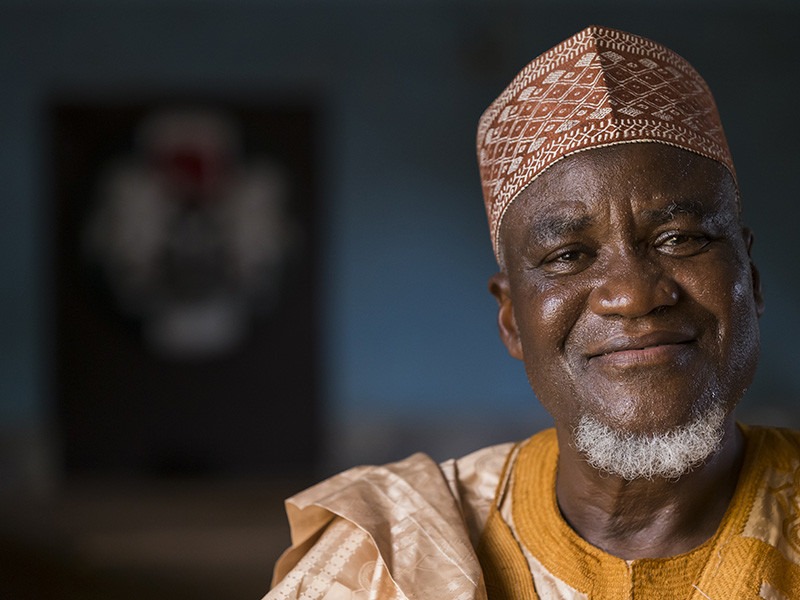
“Education is important for the development of a community. Sem isso, society cannot progress,”diz Shehu. “We are seeing drastic change and parents are giving full support to their children. They prepare them to come to school and the children are actually learning to read and write.”
To ensure the learning materials were effective for all students, the Northern Education Initiative Plus project and Governo nigeriano joined efforts to assess gender dynamics and worked to create gender-sensitive content with embedded local culture and traditions. The learning and teaching materials were also evaluated to determine their effectiveness for building phonics skills and fluency.
Joy du Plessis, Senior Reading Specialist with Creative, diz o Vamos ler! learning and teaching materials aim to reflect strong, curioso, lively and active girls and boys – especially girls.
“The images in the books show boys and girls being equal,”diz du Plessis, who navigated the curriculum design process with writer, ilustradores, language specialists and government officials in Nigeria. “The drawings communicate cooperation, independência, curiosidade, amizade, cultural norms and problem-solving.”
In the third year of a five-year project, A Northern Education Initiative Plus distribuiu mais de 4 milhões de livros didáticos lidos para alunos e professores nos estados de Bauchi e Sokoto, providing an equal opportunity for girls and boys to learn in their own mother tongue language.
Before children had access to Vamos ler! livros, Ango says the classroom environment was ineffective and students weren’t learning. No entanto, o Vamos ler currículo, textbooks and teaching training have provided a renewed focus on learning.
“Students would go from primary 1 to primary 6 and not know how to even write or read their name,”ele diz. “We see a lot of change with the children, especialmente meninas. You can sit with a child and ask him or her about the lessons, and they are eager to learn and understand. The books have entered our hearts and minds.”
